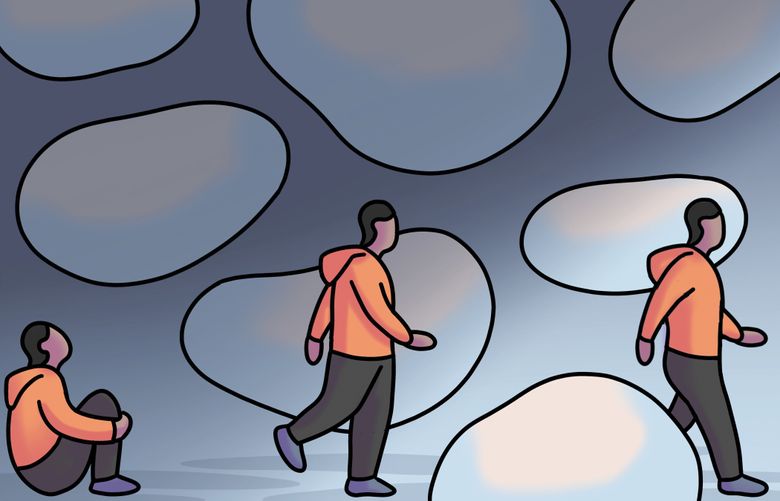
By
#SeattleTimes #MentalHealthProject reporter

The #MentalHealthProject is a #SeattleTimes initiative focused on covering #mental and #behavioralhealthissues. It is funded by Ballmer Group, a national organization focused on economic mobility for #children and families. The #SeattleTimes maintains editorial control over work produced by this team.
#Anxiety and #depression are words mired in heaviness.
Depending on your age or culture, they might be illnesses you didn’t hear much about, or something with complicated connotations. If you experience symptoms — like 1 in 3 Washingtonians did at one point last year — or know someone with these diagnoses, then you’ve likely witnessed the impact they can have on people and their families.
In an effort to better understand #mentalhealth, The #SeattleTimes offers this introduction to help demystify #depression and #anxiety. It’s not all-encompassing or meant for diagnosis: Talk with your #doctor or a #mentalhealthcareprovider if you have questions. If you are ready to find a #therapist, we have create a guide to help, and another guide for #parents to talk to #children about #mentalhealth, as well as a guide made for #youth by other #students.
For starters, while everyone can have rough patches where they feel worried, sad or just not like themselves, disorders like clinical #anxiety and #depression are typically persistent, lasting weeks or months. Though both operate on a spectrum, severe #anxiety and #depression can be emotionally and physically debilitating if left untreated.
Tamera Gittens, a licensed #mentalhealthcounselor associate working in #Seattle, explains #anxiety like this: Feeling nervous is a normal response to #stress and in some ways helpful, as it motivates people into action. It’s reasonable to worry about an upcoming work deadline, for example.
The difference is the amount of worry and the length of time spent worrying. Once that exam or deadline passes, so does the feeling. That’s not true with clinical #anxiety: the #stress lingers instead.
Anxiety can also affect people’s sleeping and eating patterns, their energy and libido levels, work or #school performance, and ultimately their relationships with friends and family.
#Mentalhealthresources from The #SeattleTimes
- #Mentalhealthresources in #KingCounty and #Washingtonstate
- Where to find diverse #mentalhealthresources in #Seattle
- #Mentalhealthresources for those struggling with life amid a #pandemic
- Here are the basic facts about #mentalhealth and treatment in #Washingtonstate
Similarly, #depression is characterized by feelings of intense sadness and disconnection, along with fatigue and negative self thoughts. At its worst, #depression can lead people to #suicidalideation, self-harm, or an attempt to end their life.
“It’s different from sadness in that at least for me, it’s more a feeling of #hopelessness,” explains Paul Currington, an Olympia resident. “It’s more gray than black, if I was to give it a color.”
Currington now speaks publicly about his experience with #depression and #suicidalideation, hoping to build connection and help others open up about #mentalhealth.
“Sometimes just finding out that someone else is struggling can be incredibly helpful,” he said. “It just makes you feel like everyone goes through this. You’re not the only one and you’re not weak because you’re having these feelings.”
Researchers are still learning how these disorders develop, though there is consensus that genetics play a part. If your family has a history of either condition, you run a slightly higher risk of developing them. Both #anxiety and #depression can be exacerbated by a stressful event or trauma like violence or abuse, or the death of a loved one.
#Anxiety can also take other shapes including panic disorders, or be attached to specific stressors (#socialanxietydisorder) or intense fears (phobias).
#Depression can be triggered by circumstances like relationship changes, financial situations, as well as medical illness. Both disorders can worsen if drug or alcohol addiction is involved or if there are other co-occurring illnesses. #Women are more likely to experience #depression than #men, as are some #communitiesofcolor and refugees, with greater risk overall among #youth and older #adults.
How exactly these two illnesses affect the brain neurologically and how that cascades to other parts of the body is still being untangled, but a couple of patterns stand out. For example, researchers are investigating the significance of higher levels of cortisol, a stress hormone, found in people with major #depression.
A separate 2020 meta analysis published in The Journal of Psychiatry and Neuroscience reviewed over 100 studies and found that the brains of people with #depression are smaller in volume in certain regions including the hippocampus, a part of the brain that deals with learning and memory. That same study also found that people with both #anxiety and #depression, however, have larger volume in the amygdala, the part of the brain associated with emotional processing.
The good news is people with both of these disorders can successfully manage their illnesses and lead full and healthy lives. Prevention and early diagnosis are key, according to experts.
#James Donaldson notes:
Welcome to the “next chapter” of my life… being a voice and an advocate for #mentalhealthawarenessandsuicideprevention, especially pertaining to our younger generation of students and student-athletes.
Getting men to speak up and reach out for help and assistance is one of my passions. Us men need to not suffer in silence or drown our sorrows in alcohol, hang out at bars and strip joints, or get involved with drug use.
Having gone through a recent bout of #depression and #suicidalthoughts myself, I realize now, that I can make a huge difference in the lives of so many by sharing my story, and by sharing various resources I come across as I work in this space. #http://bit.ly/JamesMentalHealthArticle
Order your copy of James Donaldson’s latest book,
Celebrating Your Gift of Life:
From The Verge of Suicide to a Life of Purpose and Joy


We’d like to hear from you.
The #MentalHealthProject team is listening. We’d like to know what questions you have about #mentalhealth and which stories you’d suggest we cover.
Get in touch with us at mentalhealth@seattletimes.com.
One option is #psychotherapy, also called talk therapy. Jennifer Watson, a clinical psychologist in Eastlake, encourages people to not wait for things to get worse but to take the first step and seek help.
“If your #anxiety or your #depression is creating a loss of meaning in your life, that’s enough that you should get support,” said Watson.
From cognitive behavioral therapy to exposure therapy, many forms of counseling can be helpful. #Doctors also highly recommend exercise. While it’s challenging to get moving when you’re feeling depressed or anxious, the benefits are on par with antidepressant medication.
Other treatments can include medication, electroconvulsive therapy, new forms of psychedelics-assisted counseling, equine therapy, peer counselor support groups, and more.
Watson suggests that people attending their first therapy session think through two main things: What would you like to get out of therapy? Are you looking for someone to give specific feedback, to make concrete plans, or just listen? Share that with your #therapist.
You can also ask about the #therapist’s background and what specific training styles they have. If you’re interested in a #therapist or #counselor with a spiritual or religious practice, that’s an option. There are also #therapists who specialize in work with queer or trans people, people with neurodiversity, or other experiences.
Ultimately, find a network of people to help you through this experience. Friends, family, colleagues, faith communities, and people with shared interests can all help you in this process. Many people want to talk about #mentalhealth; while #stigma still exists, it’s waning over time. According to a survey from the #AmericanPsychologicalAssociation, people in the U.S. are opening up to conversations on #mentalhealth, with over 80% of respondents agreeing that having a #mentalhealthdisorder is nothing to be ashamed of.
For Currington, the goal is to normalize conversations around #mentalhealth.
“What I would like to see in the world,” he said, “is just more people being honest about how they’re feeling.”
Esmy Jimenez: 206-305-4872 or ejimenez@seattletimes.com; on #Twitter: @esmyjimenez. Esmy Jimenez is a reporter covering #mentalhealth for The #SeattleTimes.




